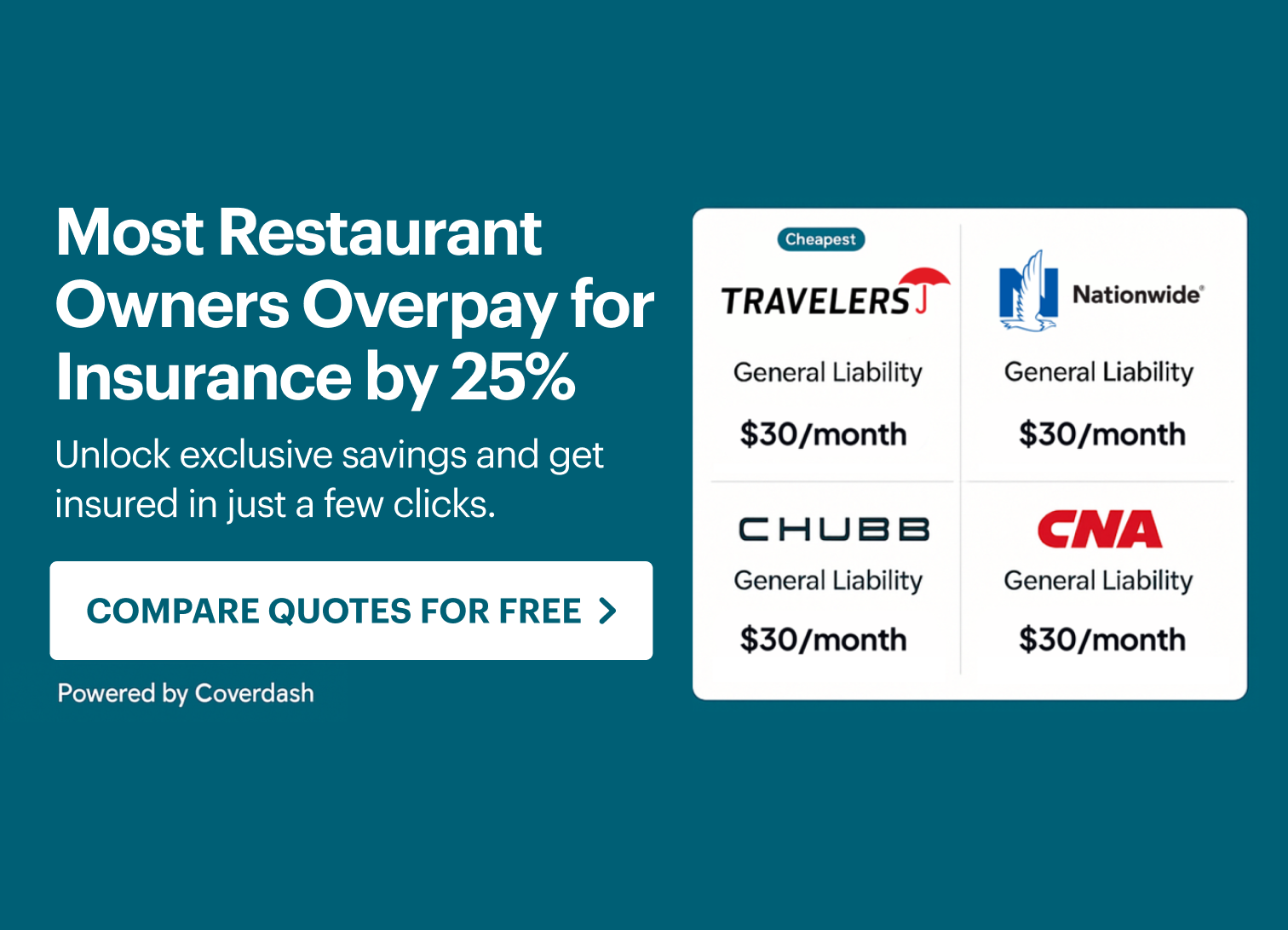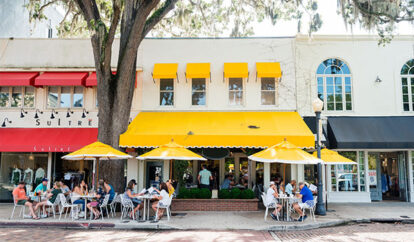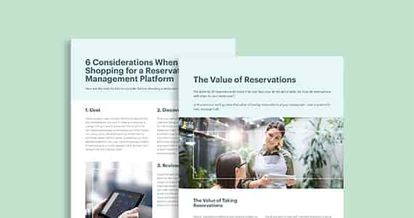Florida is known as the “Sunshine State,” the fourth most populated state in the country. According to the National Restaurant Association, there are over 40,000 eating and drinking establishments serving Floridians, generating $42 billion in revenue in the process.
If you plan to grab a piece of that $42-billion pie by opening your own restaurant in Florida, go for it!
Planning is key when it comes to opening a restaurant, so we’ve compiled this comprehensive guide to help you get started and make you successful.
We’ll cover:
- Planning: selecting the right location, leasing space, getting financed
- Getting Started: insurance, permits, licenses, accessibility compliance
- Building an Expert Restaurant Team

Planning Your Restaurant
It’s exciting to find and prepare the physical space for your restaurant, and to start the real work that will transform your dream into a reality. As exciting as it is to get into the nitty-gritty details, you still need to take your time and make sure you do everything right.
Here is a quick list of some of the things you’ll need to think about:
- Where your restaurant is going to be located in Florida
- How much you can afford in rent and how to find a restaurant to lease
- How to obtain financing for your Florida restaurant
- Who to include in your expert Florida restaurant team
Let’s take a closer look at each of these things.
Choosing a Location for Your Florida Restaurant
When it comes to choosing a location for your Florida restaurant, there are a lot of options. So, how do you make the right choice? At this point, you should have a good idea of what type of restaurant you want to open and who your target audience is. With those details in mind, think about which locations will fit the vibe you’re trying to cultivate and what kind of area can financially support your vision.
Here are some specific questions you can ask yourself as you start thinking about the best location in Florida to open your restaurant:
- Is this city/neighborhood a good fit for my concept and vision?
- What is the population base and main demographic for this area?
- What are the residents in this area looking for in a restaurant?
- What is the average net worth and disposable income of residents?
- What kind of buildings and restaurant spaces are available in this area?
Answering these questions will help narrow down your search to a city, or perhaps even a specific neighborhood in Florida. Before you set your heart on any one location, however, you should perform a location analysis to see whether the numbers line up. A location analysis takes a closer look at details such as the number of customers you’ll need to keep your restaurant profitable, the neighborhood’s density of your target market, and important research on local competition.
For more information about analyzing and choosing the right location, click here.
If you’re still not sure where to look for restaurant space that will suit your concept, consider the distinct characteristics of the most popular cities in Florida:
Orlando – Located in the heart of Florida, Orlando is the “Theme Park Capital of the World,” drawing over 55 million visitors each year. It’s also been rated one of the country’s best places to live.
Miami – Nicknamed the “Magic City,” Miami is filled with A-list beaches, swanky nightclubs, an amazing foodie scene, and, of course, the 90,000 beautiful people who frequent these locations.
Tampa – Located along the west coast, Tampa is an up-and-coming scene for young professionals, home to nightspots, professional sports, great entertainment options, and wonderful restaurants.
West Palm Beach – There is no shortage of wealthy neighborhoods in this area, not to mention yachts and ocean-front mansions. The population is a little older, but there is no doubt that the residents have plenty of disposable income.
Boca Raton – Located along the southeastern coast of Florida, Boca Raton is known for its golf courses, parks, and, of course, its beaches. You’ll also find plenty of culture ranging from museums to concert venues, nightlife, restaurants, and more.
How to Lease Your Restaurant
Chances are, you will be leasing property for your Florida restaurant rather than purchasing it outright. Once you’ve chosen your preferred location, you’ll need to spend some time looking for the perfect property.
When looking for properties to lease for your restaurant, there are many factors to consider. First and foremost, think about the practical – how much you can afford to pay in rent. Unfortunately, you can’t predict exactly how much revenue your restaurant will have, so the best way to determine how much you can afford is to pay no more than 6% to 10% of your gross sales as the total occupancy cost. This will include rent as well as your property taxes, insurance, and other operational costs.
Think about your restaurant concept and find a property that fits. Even if you have a specific concept in mind, be prepared to make adjustments based on factors such as your target audience, menu pricing, and your projected annual sales. If these things don’t all line up, you might need to reconsider your options.
Only after you’ve determined how much you can afford to pay in rent and what kind of location will fit your concept, can you start to actually look at properties. Find properties that fit your criteria by working with a real estate broker, searching for restaurants for lease online, and by driving around your ideal area looking for “For Lease” signs.
A Florida restaurant real estate broker is a key addition to your Florida expert restaurant team. We’ll go into greater detail about assembling an expert team below. For now, here is important information about leasing a restaurant space.
- How to Get Financing for Your Florida Restaurant
Now that you’ve got your eye on the perfect location for your Florida restaurant, it’s time to acquire financing. Opening a restaurant costs thousands of dollars, and that’s before you even open the doors. So, where do you get the money for your new restaurant? Here are some ideas:
- Friends and family
- Online lenders and SBA-guaranteed loans
- Grants
- Food incubators
- Investors
- Crowdfunding
- Banks and traditional small business loans
Let’s take a closer look at some of these options.
- Friends and Family
If you’re opening a restaurant, your friends and family will probably be some of your best customers. Before opening, consider sourcing them for a personal loan to avoid high-interest charges and collateral. When entering into a financial relationship with friends or family, it’s especially important to set clear expectations and put everything in writing to avoid any negative impact on those relationships.
- Online Lenders and SBA-Guaranteed Loans
Online lenders are similar to banks but they don’t have a physical location. You can submit an application online and receive funding much faster than through a traditional bank. An SBA-guaranteed loan is a program administered by the U.S. Small Business Administration that matches you with an online lender appropriate for your business. Find more information here.
- Grants
Depending how large your restaurant operation is going to be, you might qualify for a grant. Talk to your local economic development agency or the Florida Department of Revenue to see what your options are. You can also try Grants.gov.
- Food Incubators
As a new alternative to traditional financing, modern restauranteurs are turning to kitchen incubators, or food incubators. An incubator is a designated space where new businesses can test their concepts on a smaller scale, usually for an hourly rate.
- Investors
Another source for funding is the private investor. A private investor might be able to offer a larger sum of money than you’d get from a bank or online lender, but you’ll have to give up a portion of your ownership. Here is a list of Florida investors who might be interested in your restaurant.
- Crowdfunding
This is a financing platform that raises money through the collective efforts of friends, family, customers, and individual investors. Kickstarter was one of the original crowdfunding platforms that has helped over 10 million people finance their projects. FoodStart is a crowdfunding platform specifically for restaurants, breweries, food trucks, and other food businesses.
- Banks and Traditional Small Business Loans
A restaurant is generally considered a high-risk investment by most banks, so it may be difficult getting a bank loan or a line of credit. The exception is if you have a large amount of collateral or the ability to make a large down payment. It might also help if you have proven restaurant experience and a perfect credit score. You’ll need to submit a loan proposal for consideration – find more information here.
For more information about these and other options for financing your Florida restaurant, click here.
Getting Started
In this section, we’ll talk about the business licenses, permits and insurance for Florida restaurants.
Here are some of the topics we’ll cover:
- Choosing the right insurance policies to cover a restaurant in Florida
- Getting the right permits, licenses, and registrations for a Florida business
- Making sure your restaurant is compliant with the Americans with Disabilities Act (ADA)
Let’s start by taking a look at the different types of insurance you’ll need when opening and running a restaurant in Florida.
- What Kind of Insurance Does a Florida Restaurant Need?
If something goes wrong with your restaurant and you aren’t covered by insurance, you might end up paying the bill yourself. With a significant event like a fire or a liability lawsuit, you could be looking at thousands of dollars out of pocket. There are a number of different insurance policies you’ll need to consider for a Florida restaurant, and a restaurant insurance broker can help you create a custom policy to suit your needs.
Here are some of the different types of insurance you might need as a restaurateur in Florida:
- General Liability Insurance – This policy protects you and your restaurant from third-party liability for things like bodily injury, property loss or damage, allergic reactions, and slander.
- Property Insurance – This type of insurance protects your business assets against things like damage caused by fire, windstorm, theft, vandalism, and power surges/outages.
- Off-Premise Insurance – This policy covers you if you have a business that travels with your covered items – this includes things like leased or rented equipment, equipment used in transit or at a venue, accounts receivable, and replacements due to broken or damaged equipment.
- Liquor Liability Insurance – This insurance protects you if you are sued for damaged caused by intoxicated patrons as well as employees who drink while working, crimes committed by intoxicated patrons, or fights that occur on your property.
- Business Owner’s Policy – This is a policy that bundles coverage from multiple plans such as general liability, property insurance, and business interruption insurance.
- Worker’s Compensation Insurance – This policy provides coverage for employees who are injured or killed while fulfilling their duties at work.
- Hired and Non-Owned Auto Insurance – This type of insurance covers your business if you’re sued for an auto accident that happens in a rented or personal vehicle that involves one of your employees or one that happens when the driver is performing business duties.
- Umbrella/Excess Liability Insurance – This is simply a policy that extends the limits of your general liability, employer’s liability, or hired and non-owned auto insurance policies.
In addition to these types of insurance, you might also need coverage for business interruption or loss of business, employment practices liability, and commercial crime insurance. Your needs will vary depending on the particular type of restaurant you plan to open. Consult with your restaurant insurance broker for more information on requirements in your location.
- Understanding Florida Taxes, Registration, Permits, and Licenses
As a business owner, you’ll have to pay taxes on the income from your restaurant, depending how you file. You’ll also have to pay taxes for sales, payroll, and more. Because business taxes can be complicated, you may want to consider adding a restaurant accountant to your expert restaurant team to handle them for you. We’ll talk more about that later but, for now, here’s a quick overview of the different types of taxes you’ll need to consider as a Florida restaurateur:
- Income Tax – As a business owner, you’ll be filing your income taxes based on the type of business you have. If you file as a sole proprietor, you’ll file your business income tax on your personal tax return. Corporations and LLCs, however, must file a business tax return.
- Payroll Taxes – There are two types of payroll tax: deductions from employee wages and taxes you pay based on your employee’s wages. Payroll taxes cover employee Social Security, Medicare, and Federal Unemployment taxes.
- Sales Tax – This is a tax imposed by the government on the sale of goods and services, so you’ll be charging sales tax on every bill and paying it out to the government. Food and beverages sold in Florida is subject to a 6% state sales tax. You may also be charging city, county, and local taxes which vary depending on your jurisdiction but may be as high as a total of 8%.
- Taxes on Tips – Many restaurant employees work for tips, and they are required to report those tips as taxable income. If your employees earn more than $30/month in tips, they are classified as tipped employees and must claim their tips. Gratuity is taxable to the restaurant when it is a mandatory charge added to the bill. Tips given voluntarily above the amount of the bill, or if specifically stated on the invoice that it is a gratuity, are not taxable to the restaurant if given entirely to employees.
For more information specific to taxes affecting Florida restaurants, review this official document.
In addition to being prepared for taxes, there are certain permits and licenses you’ll be required to obtain prior to opening your Florida restaurant.
The first thing you’ll need is a business license obtained from the Florida Department of Business and Professional Regulation’s Division of Hotels and Restaurants (DBPR). To obtain this license, you’ll need to complete the following:
- Food Service Plan Review – As a new restaurant, you must submit a food service plan for review, and it is recommended that you do so prior to construction to avoid costly modifications. In this plan, you’ll be required to provide scaled drawings and a copy of the proposed menu. You’ll also be required to pass a sanitation and safety inspection prior to opening. Here is a detailed guide for filling out the application and submitting it for review.
- Application Forms – You’ll be required to fill out certain forms on the DBPR website depending on the type of restaurant you plan to open. For example, if you plan to serve alcohol, you’ll need to apply for a liquor license or have the license of an existing restaurant transferred to you. To determine which forms you need to fill out, check out this guide.
- License Fees – When submitting your food service plan for review (as well as other application forms), you’ll be required to pay the applicable license fees. Here is a calculator for those fees.
- Sales Tax Registration – Prior to opening, you must obtain a sales tax registration number from the Department of Revenue or obtain proof of exemption.
- Employer Identification Number (EIN) – In order to submit taxes, you’ll need to register for an Employer Identification Number (EIN) or a tax ID. You’ll receive one of these numbers after applying for an LLC, for-profit corporation, non-profit corporation, or LP/LLP. Find more information here.
- Inspection – Prior to opening, you’ll need to contact the DBPR to schedule a safety and sanitation inspection. These inspections are performed by the County Health Department (CHD), and your business will be given a Satisfactory, Unsatisfactory, or Incomplete rating, depending how many violations (if any) are present. From there, you’ll be allowed to open or asked to make corrections prior to opening. For more detailed information on this process, review this guide.
- County and Local Requirements – In addition to these requirements, your Florida restaurant may also be subject to regulations based on your country or municipality. These may include obtaining a certificate of occupancy, a flammable materials permit, a health department permit, and/or a sign permit.
The process to obtain a Florida business license can be confusing if you’re new to the restaurant industry. To help you navigate, consider hiring a Florida business attorney. We’ll talk more about the benefits of including a Florida restaurant attorney in your expert restaurant team later. For now, find more information about licenses and permits for a restaurant here.
- Tips to Make Sure Your Restaurant is ADA-Compliant
In the United States, all small businesses are required to be compliant with the Americans with Disabilities Act (ADA). The ADA is a Federal civil rights law that prohibits businesses from excluding persons with disabilities from everyday activities.
In simple terms, your restaurant must be accessible to disabled persons through reasonable means. This may require you to make certain structural modifications to your business to ensure accessibility for the business (including parking) by persons using wheelchairs or other mobility devices. The ADA outlines specific requirements, but here are some of the most important:
- Removing Architectural Barriers – Architectural barriers are physical features that might limit or prevent a disabled person from accessing or obtaining goods or services from the restaurant. These may include things like narrow aisles, fixed seating, and difficult door hardware.
- Providing Accessible Parking – You must provide designated parking accessible to handicapped patrons with the addition of space to the left or right to provide access to persons using wheelchairs and other mobility devices.
- Creating Accessible Entrances – Businesses must provide entrances that are accessible by handicapped patrons to provide access from sidewalks, parking, or public transportation. Modifications such as installing a ramp or lift and removing steps may be required.
- Providing Maneuvering Space – In addition to accessible entrances to the restaurant, you must also provide ample maneuvering space inside the building for people using wheelchairs and other mobility devices. This may require you to add space between tables or shelving.
For more information about making your Florida restaurant ADA compliant, call 1-800-514-0301. Review this page to learn about tax credits and deductions to help you pay for ADA-required modifications to your business.
Building a Florida Expert Restaurant Team
Taking your dream and turning it into a reality is a big undertaking and not one you should attempt to do alone. Building a team of Florida restaurant experts will help ensure that you do things correctly, and that those things happen within a reasonable time frame. With the right team of experts at your back, the whole process of opening a restaurant in Florida will be easier.
Here are some of the people you’ll want to include in your team:
- Restaurant Consultants
- Restaurant Insurance Broker
- Restaurant Real Estate Broker
- Restaurant Accountant
- Restaurant Attorney
- Restaurant Construction and Remodeling
Let’s take a closer look at the role each of these experts plays, and list some of the best in Florida.
1. Restaurant Consultant
Your restaurant consultant will assist you in any task associated with opening a restaurant including developing your business plan, creating and pricing your menu, selecting a location, implementing systems and procedures, designing your kitchen, and training your staff. The hourly rate for a restaurant consultant generally ranges from $99 to $350 per hour.
Here are some of the top restaurant consultants in Florida:
2. Restaurant Insurance Broker
The primary task of a restaurant insurance broker is to help you determine your business insurance needs and to find the right policies to meet those needs. Your insurance broker will also be able to assist you with local regulations and will assist you in the event of a claim. Restaurant insurance brokers are typically paid by commission through the insurance company, so there is no reason not to hire one.
Here are some of the top restaurant insurance brokers in Florida:
3. Restaurant Real Estate Broker
Also known as a commercial real estate agent, a restaurant real estate agent will help you find the ideal property for your restaurant and will help you negotiate the lease. A broker will provide you with access to private listings you might not otherwise see. In most cases, a broker charges a percentage of the total sale or lease price on contingency.
Here are some of the top restaurant real estate brokers in Florida:
4. Restaurant Accountant
Hiring a restaurant accountant from the start of your business will help you stay organized and compliant with general bookkeeping, creating a budget, managing finances, performing financial analysis, and managing payroll. Most restaurant accountants charge by the hour, ranging from $60 to $250 per hour.
Here are some of the top restaurant accountants in Florida:
5. Restaurant Attorney
A restaurant attorney provides legal guidance wherever you need it. This may include drawing up contracts, registering your business, submitting trademark applications, and ensuring labor law compliance. For a new restaurant, you’ll probably be charged an hourly rate between $150 and $800.
Here are some of the top restaurant attorneys in Florida:
6. Restaurant Construction and Remodeling
Once you have the design concept for your restaurant, a restaurant construction and remodeling crew will help you turn it into a reality. They will also help you navigate the details of bringing your property up to code and ensuring safety compliance. Charges vary from $85 to $300 per square foot.
Here are some of the top restaurant construction and remodeling companies in Florida:
Learn more about building your team of Florida restaurant experts and get costs here.
Sign up for our free weekly TouchBistro Newsletter





